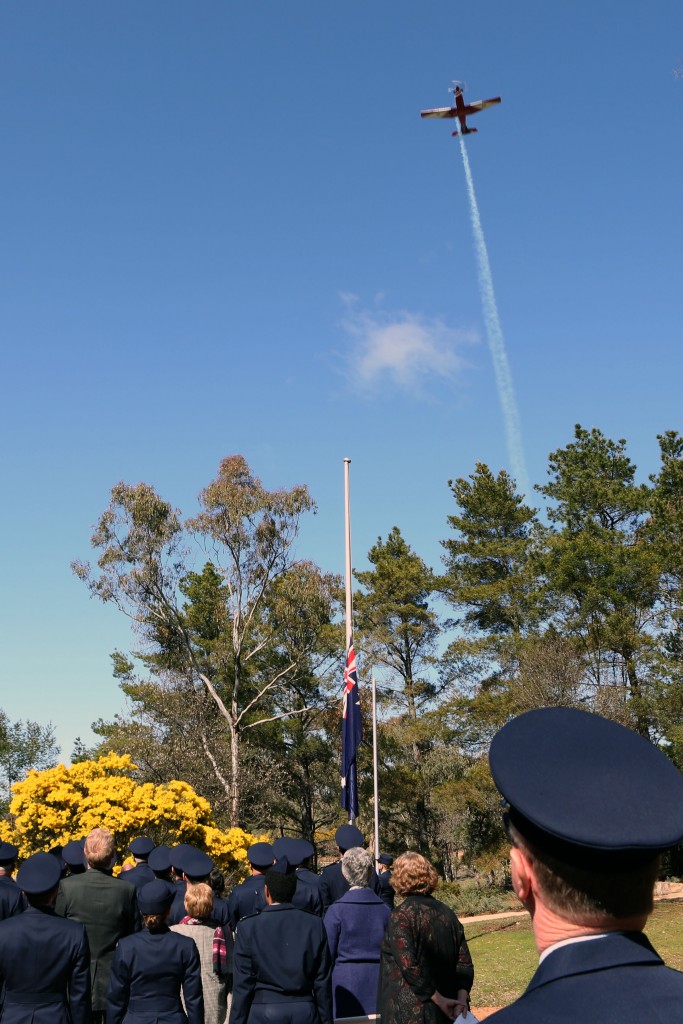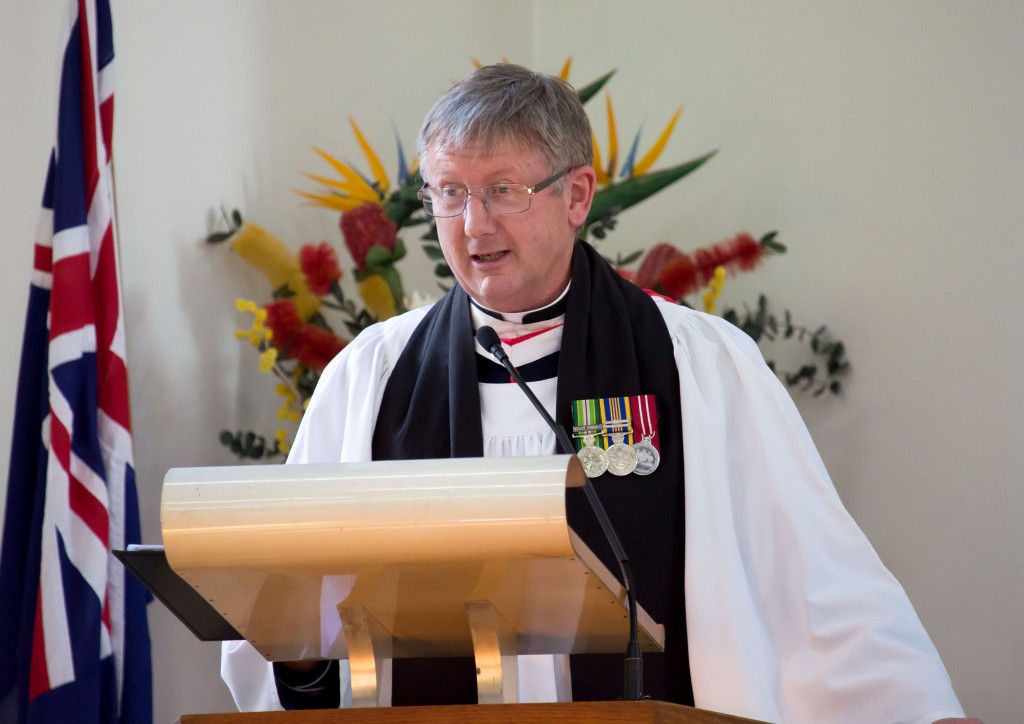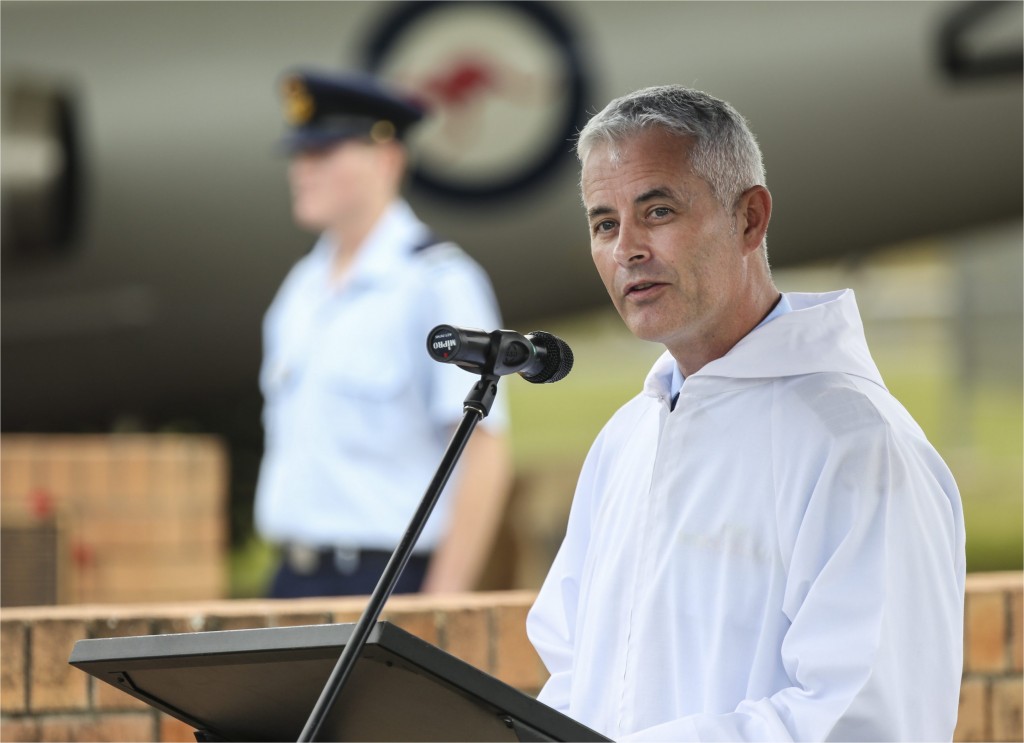In an emergency, the Royal Australian Air Force are usually the first responders from the defence forces. They’ve got the fast planes. An air force chaplain was on the first plane out of Darwin after the Bali bombings in 2002. And the Air Force Chaplain Branch always has a chaplain on standby in the critical response team, ready to move anywhere with 24 hours notice.
2015 marks the 75th anniversary of the Air Force Chaplain Branch, an expeditionary branch that has served in Japan, Korea, Vietnam, Kuwait, East Timor and the Middle East.

A PC-9 Roulette aerobatic display aircraft, from the Central Flying School in East Sale Victoria, performs a low-level fly-past during the ’75th Anniversary of the Chaplain Branch’ Commemorative Service. © Commonwealth of Australia, Department of Defence
Director General of Air Force Chaplaincy and Principal Anglican Air Chaplain, Kevin Russell says while the world has changed in that 75 years, the role of the chaplain remains constant.
“In essence, chaplaincy is still being an ambassador for Christ. That hasn’t changed. But the ‘how’ of being present and participating in the community, being able to move alongside people and speak to their issues, that I think has become sharper,” he told Eternity.
Whether in uniform or in civilian life, the work of a chaplain deals with age-old human issues, says Chaplain Russell. Regardless of whether you work in defence or not, everyone goes through the same types of crises and experiences the same kinds of joys.
“The difference for defence chaplains comes to a crux when you take people away from their families and place them on operations,” he said.
The Army, Navy and Air Force all have chaplain branches to deal with specific issues for their personnel. The Air Force is a “highly technical force,” says Chaplain Russell, “so the way we communicate is a little different. We’re perhaps a little more flexible, a little less ‘regi’ [regimental].”
Chaplain Russell spent some time in East Timor in 2001 on deployment with Australia’s peacekeeping troops. East Timor was holding its first elections after it achieved independence from Indonesia, following decades of bloodshed and violence. Chaplain Russell’s days were filled with visiting the United Nations military hospital, visiting border regions and supporting locals still reeling from the violence. He says the most striking thing about being on deployment is the people you see at church; people you’d never see there on Australian shores.
“People I knew from back home who never went to church came to chapel services in East Timor. They never expressed why, but they came.” Chaplain Russell thinks it’s because on deployment – even on peacekeeping missions – in the corner of your mind, military service people are coping with life and death issues. And it’s then they’re more likely to want to talk about God.”

The Director General – Chaplaincy Air Force, Air Commodore Kevin Russell, delivers a sermon at a church service held at the Chapel of St. Paul at the Royal Military College Duntroon. © Commonwealth of Australia, Department of Defence
Earlier this year Chaplain Kevin O’Sullivan was deployed with Operation Hawick, the Australian Defence Force support for the Abbott Government’s “Operation Bring Them Home,” in response to the MH17 air disaster in Ukraine.
Part of the mission was the repatriation of victims’ bodies from the air tragedy.
“They [the air force squadron] called for chaplaincy support because they recognised the need to support the mental and spiritual wellbeing of those on the operation,” said Chaplain O’Sullivan. He was only in the Netherlands, the base for international investigations into the incident, for 16 days, but he said his presence was a relief to the servicemen and women.
“I think just the presence of ‘the God person’ is respected. It allows people to talk and tell their story, what’s happened for them, whatever that might be. It doesn’t seem to matter whether they have a strong sense of God in their life.”
Chaplain Sullivan has been an air force chaplain since 2007 but has been in the Air Force since 1988 when he started as a communications operator. He says defence chaplaincy is entirely missional.
“I’m invited into other people’s spaces, other people’s lives. I need to meet people where they are. On operations, we’re the support mechanism and we have a strong reputation that the chaplain is always there for you.
“We wear the same uniform and we go through the same rigours as everybody else. So there’s a familiarity, but then we can move a little easier through the layers of a large organisation. No matter their rank, people value that when they come to us they can be themselves and say what they need to say. And there’s always the possibility to be a kind of prophetic voice, someone who draws them a picture of Christ and offers a different way to see the world.”

Chaplain Kevin O’Sullivan provides a spiritual reflection during a Commemorative Service. © Commonwealth of Australia, Department of Defence
Chaplain Sullivan says the next 75 years of air force chaplaincy are unlikely to look much different from the last 75. There might be different faith groups that come in – indeed reports this week that Australian Army chaplains are considering changing a long-standing badge that features a stylized cross and the motto “in this
sign conquer” to something more multi-faith caused something of an uproar – but Sullivan says a caring person eager to listen is always the most important trait of a chaplain. And Chaplain Russell agrees.
“We’re immersed in the day-to-day workings of the air force and its people. That gives us the right to speak. And the more we do that, the more value it adds,” says Chaplain Russell.
“Ultimately, we help deal with their issues as a good listening ear to them and help them when they’re struggling. But we’re also representatives of God. People know that. They may not be able to name that, but they know that there’s something about what a chaplain represents that touches upon their sense of spirituality. And if we can connect them with God, well, good. And if it’s just a listening ear and support that way, to carry them through to the next day, that’s good too.”
Email This Story
Why not send this to a friend?
